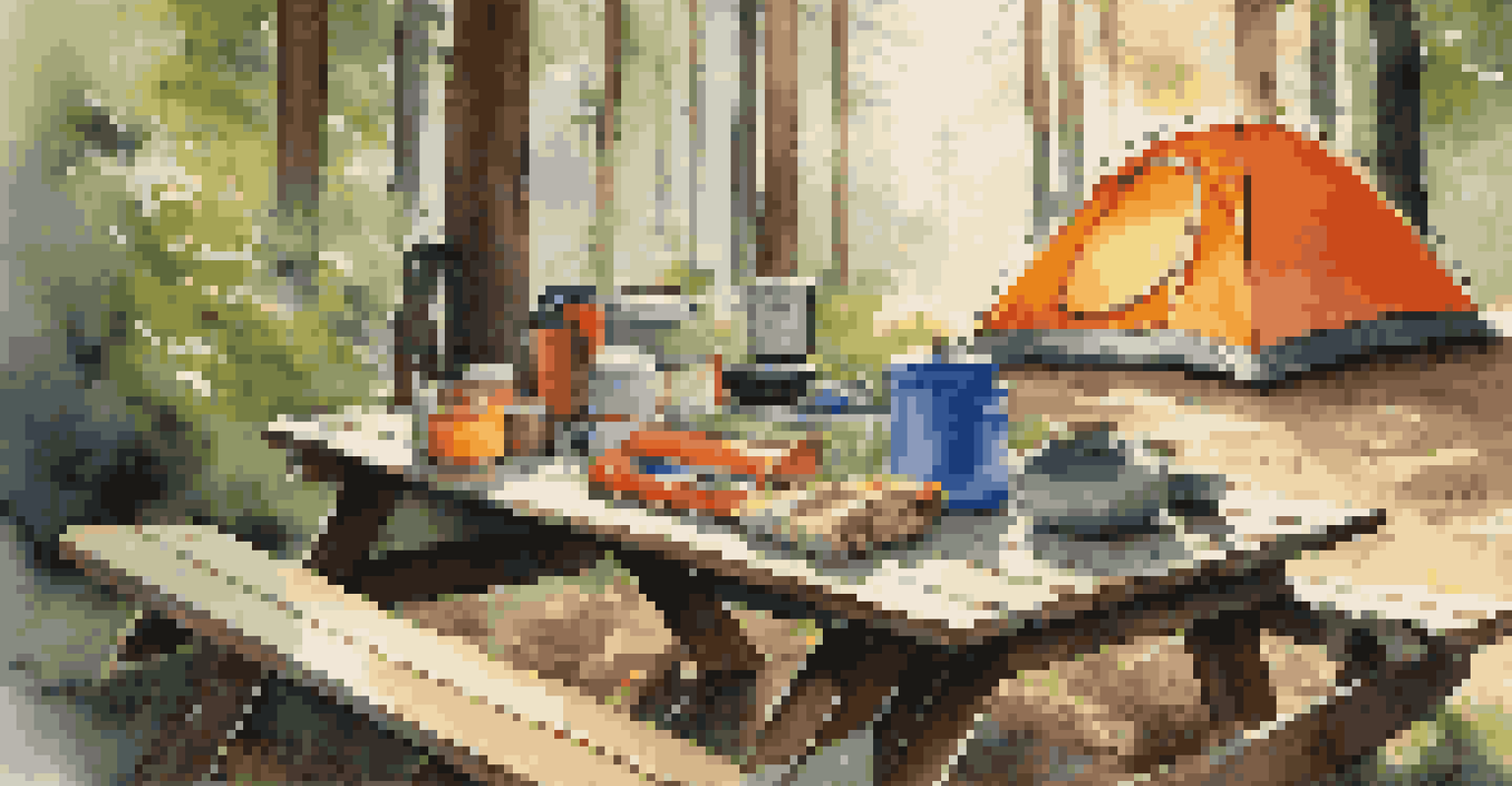Camping Gear Checklist: What to Pack for Your Trip

Start with the Basics: Tent and Sleeping Gear
The foundation of any camping trip begins with your shelter. A good-quality tent is essential for protection against the elements, so choose one that suits your group size and the weather conditions you anticipate. Don’t forget to pack a matching footprint or tarp beneath it to prevent moisture from seeping in.
The goal of camping is to get back to nature, but it's also about enjoying the great outdoors in comfort and style.
Sleeping gear is just as crucial for a good night's rest after a long day of adventure. Consider sleeping bags rated for the temperatures you'll encounter, along with sleeping pads or air mattresses for added comfort. If you’re camping in colder climates, a sleeping bag liner can provide extra warmth.
Lastly, pillows may be overlooked, but they can make a significant difference in your sleep quality. If you want to save space, consider using stuff sacks filled with clothes as makeshift pillows. Remember, a well-rested camper is a happy camper!
Cooking Essentials: Gear Up for Meal Prep
When it comes to outdoor cooking, having the right gear can elevate your camping experience. Start with a portable stove or a camping grill, and don’t forget the fuel. Some campers prefer cooking over an open fire, so be sure to pack matches or a lighter, along with fire starters to make igniting it easier.

Utensils are another vital component of your cooking setup. Bring along pots, pans, and a set of cooking tools, such as spatulas and tongs. A multi-tool can also be handy for various tasks, from opening cans to cutting food, saving you from carrying multiple items.
Essential Camping Gear Checklist
Having the right tent, sleeping gear, and cooking essentials is crucial for a comfortable and enjoyable camping experience.
Lastly, consider your food storage needs. A cooler is essential for keeping perishables fresh, while dry food can be stored in airtight containers. Make sure to pack a good supply of plates, bowls, and utensils for serving, as well as cleaning supplies like biodegradable soap for a responsible cleanup.
Clothing: Dress for Comfort and Protection
Packing the right clothing is crucial for an enjoyable camping experience. Start with moisture-wicking layers that keep you dry and comfortable, especially if you plan to hike or engage in other physical activities. A good base layer, an insulating mid-layer, and a waterproof outer layer can help you adapt to changing weather conditions.
Leave nothing but footprints, take nothing but memories.
Don’t forget about footwear! Sturdy hiking boots are a must for exploring rugged terrains, while camp shoes or sandals provide comfort around your campsite. Additionally, pack extra socks and underwear, as keeping dry is key to feeling good on your trip.
Accessories can enhance your comfort, too. Hats and sunglasses protect you from the sun, while gloves and beanies keep you warm in colder weather. Remember to pack a swimsuit if you're heading near water; you never know when you might want to take a dip!
Safety First: First Aid and Emergency Gear
Safety should always be a priority while camping, so packing a first aid kit is essential. Customize your kit with items like band-aids, antiseptic wipes, pain relievers, and any personal medications. It's also wise to include a whistle and a flashlight for emergencies, ensuring you’re prepared for unexpected situations.
In addition to your first aid kit, consider bringing a multi-tool or knife. These can serve multiple purposes, from food prep to gear repairs, making them incredibly versatile on your trip. A portable phone charger is also a wise addition, keeping devices powered for navigation or communication.
Prioritize Safety on Your Trip
Packing a first aid kit and familiarizing yourself with the local environment can help ensure a safe outdoor adventure.
Lastly, familiarize yourself with the area where you’ll be camping. Knowing the local wildlife, potential hazards, and nearest medical facilities will help you feel more secure. Always share your itinerary with someone who isn’t joining you, just to keep everyone informed.
Navigation and Communication: Stay on Track
When you’re out in the wilderness, proper navigation tools are essential. A detailed map of the area and a compass are great for traditionalists, while a GPS device or smartphone app can offer additional convenience. Just remember, technology can fail, so have a backup plan!
It's also smart to pack a portable charging device for your phone, ensuring you can stay connected when needed. If you plan to venture into remote locations, consider bringing a satellite phone or a two-way radio, especially if you’re going with a larger group.
Lastly, always let someone know your plans, including your expected return time. This simple step can make a big difference in case of an emergency, allowing others to alert authorities if you don’t return as planned.
Lighting the Way: Lanterns and Headlamps
As the sun sets, having proper lighting becomes essential for safety and convenience. A reliable lantern can illuminate your campsite, making it easier to navigate around at night. Look for LED lanterns that provide bright, long-lasting light with minimal battery usage.
Headlamps are another fantastic option, especially for hands-free tasks like cooking or setting up your tent. They’re lightweight and can easily be strapped to your head, allowing you to focus on what you’re doing without fumbling with a flashlight.
Embrace Eco-Friendly Practices
Following Leave No Trace principles protects the environment and preserves the beauty of nature for future campers.
Don’t forget extra batteries! It’s frustrating to be left in the dark simply because you didn’t pack spares. If you're camping for several days, consider bringing solar-powered lights to recharge during the day for free lighting at night.
Comfort and Entertainment: Relax and Enjoy
Camping isn’t just about survival; it’s also about enjoyment! To enhance your comfort, consider packing camping chairs or portable hammocks. These can provide a cozy spot to relax after a day of hiking or exploring, making your campsite feel more like home.
Entertainment is also key to a fulfilling camping experience. Bring along books, playing cards, or a portable game for some fun during downtime. If you're camping with family, group games can create lasting memories.

Lastly, don’t forget about your personal touch. Whether it’s a favorite blanket or a portable speaker for music, these little comforts can transform your trip from ordinary to extraordinary. It’s all about creating an enjoyable atmosphere, even in the great outdoors.
Leave No Trace: Eco-Friendly Camping Practices
As you prepare for your camping adventure, it’s crucial to consider your impact on the environment. Adopting Leave No Trace principles can help minimize your footprint. Start by packing out all trash and leftover food, ensuring you leave the campsite as you found it.
Using biodegradable soaps and cleaning products is another way to protect nature. This ensures that you’re not introducing harmful chemicals into the ecosystem. Additionally, try to stick to established trails to prevent damaging delicate plant life.
Finally, educate yourself about local wildlife and respect their habitats. Avoid feeding animals and store food securely to prevent attracting them to your campsite. By practicing eco-friendly habits, you’ll help preserve the beauty of the outdoors for future generations.